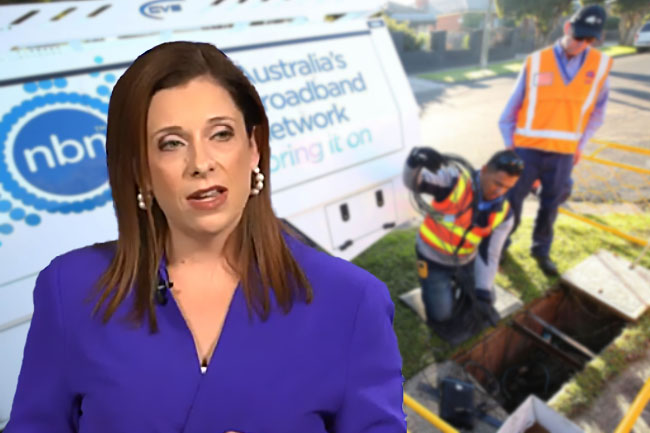Australia has been struggling with an inadequate NBN system, but hopefully a change in government will amend that, writes Paul Budde.
OVER THE LAST FEW MONTHS, further information has come to light about the problems the NBN is facing and it is clear that the Government will have to step in in order to address the mountain of problems with the service. However, in all reality, this will not happen until after the Federal Election.
The regular Ookla ranking put Australia even further down on the international ladder of broadband speeds. It is now sitting in position 60. There have been arguments that this also had something to do with the way the list was produced this time, but it doesn’t really matter whether we are in position 60, 55, or even 40. We are so far down the list that any of those ratings are an embarrassment for the country.
I am just back from the Netherlands where I enjoyed FTTH services both at the homes of family members and in the Airbnbs we stayed in and it is just a joy to use the internet at such great speeds. Unlimited speed of 100Mb/s and more at access costs of around €50 — to improve their profitability, ISPs also package a range of entertainment, home security and other (telecoms) services into their offerings, so overall packages are sometimes closer to €80.
“Tech companies such as Google may therefore be forced to roll out “less intensive settings” that “automatically scale down” and reduce the quality of online services in countries with inferior internet speeds – like Australia.” #nbn https://t.co/2knXpUUIwI
— Ivan Zrinscak (@Ivan_Zrinscak) March 21, 2019
Back to Australia. Some of the other problems we also saw mentioned in the media comments include that there are still a large number of NBN connections that have been put in the too-hard basket — by mid-2018 there were close to 1.5 million of them, many in relation to the HFC problems that the company is facing. This put the overall reliability of the NBN in several states below the ACCC standard.
But perhaps we should now stop crying over spilt milk. The NBN is what it is and we should take the current situation as the base from which we need to make improvements. The trouble is that because of the politicisation of the NBN it is very difficult to get a good understanding of the nature of the problems and any new government will need to first examine this with a group of truly independent experts (and not hand-picked political favourites).
As mentioned in my previous analysis, back in the period of 2005-2009 I was heavily involved in the strategies around the NBN. From the very first, I said that we needed an FTTH NBN because of the social and economic benefits. Stephen Conroy – first as the Opposition’s Minister for Communications and later in his position as the Minister for Broadband and the Digital Economy – mentioned several times that this was the reason he supported a national broadband plan that was framed around an FTTH infrastructure. Also, I have maintained from day one that people are not going to pay more for an FTTH connection. The business model should be based on the economic and social benefits as well as commercial revenue, not just on commercial revenue.
While the government of the day paid extensive lip service to this model, they never put a financial model in place that reflected the social and economic benefits. So, yes, the Labor Government can be blamed for not setting such a model in concrete.
If the heads of Australia's biggest telcos are to be believed, a major crisis is brewing over the national broadband network. Full article here -> https://t.co/Yo1FfIG5Re#telco #nbn #connectivity #stratanetgroup pic.twitter.com/uqcbC1hMBX
— Stratanet (@stratanetgroup) March 20, 2019
Malcolm Turnbull hammered this home, asking many times for the cost-benefit analysis, but, when he subsequently took charge, he himself – despite promises – failed to come up with one.
In my view, this is the root of all our problems. We, as a country, never properly addressed why we implemented the NBN and consequently we never properly linked the national benefits to the business and financial models. If Labor had remained in power, it would not have been such a problem if there had been cost blow-outs, as they would have continued to talk up the benefits. The Coalition hardly ever mentioned those benefits and certainly not within the context of business and financial models. So, by ignoring this, they only dug themselves deeper into the NBN morass.
We need to come back to this and we should get bipartisan support based on the national interest, not on party politics. We need to stress the national benefits and build a proper business model in which that is recognised. Any cost-benefit analysis will always be arbitrary, but we should still bite the bullet. However, there is no use trying this without bipartisan support and I think that was the reason subsequent governments didn’t come up with such a calculation, as you can shoot down any cost-benefit analysis if there is not the political will for bipartisanship.
If we properly address those national fundamentals, then I believe that we can both solve the current situation and address the future needs of the NBN.
But all of that will take a long time to fix. However, any incoming government can, with the stroke of a pen, create a situation where people can use higher speeds at an affordable price on the NBN as it exists today. For this to happen, the complex wholesale pricing will need to be simplified. The incoming government could just do that and this would make higher speed services available at more affordable prices.
The wholesale price system is so complicated that I will not even try to explain it, nor should any incoming government try to descramble that egg — instead just scrap it and come back with a simplified structure. I understand that this will require the Government to write off some of its investment in the NBN, but so be it.
At the moment, retail service providers have to employ extra specialist resources to understand the myriad of complicated wholesale pricing options that the NBN company has wrought together. In general, this means that as a result of these unattractive wholesale processes, the low-cost entry is now too expensive for RSPs to offer this option to their customers. At the same time, the higher speed options remain too expensive for many users. This is contrary to the sprit of the NBN, it should provide all Australians with affordable high-speed broadband services.
What a mess. Let’s see how the next government get themselves out of this muddle.
Paul Budde is managing director of Paul Budde Communication, an independent telecommunications research and consultancy organisation. You can follow Paul on Twitter @PaulBudde.
As Australia slips to 60th, behind Trinidad and Tobago, in the internet @speedtest rankings, leaked emails show industry veterans are split on how to fix the NBN. https://t.co/Vi6NpgXNNj
— The Saturday Paper (@SatPaper) March 19, 2019
 This work is licensed under a Creative Commons Attribution-NonCommercial-NoDerivs 3.0 Australia License
This work is licensed under a Creative Commons Attribution-NonCommercial-NoDerivs 3.0 Australia License
Support independent journalism Subscribe to IA.












